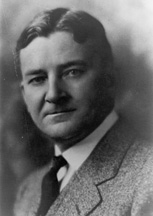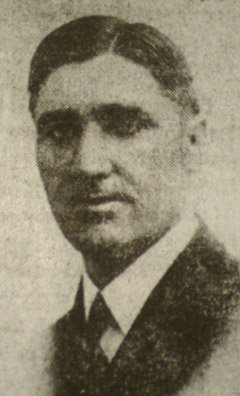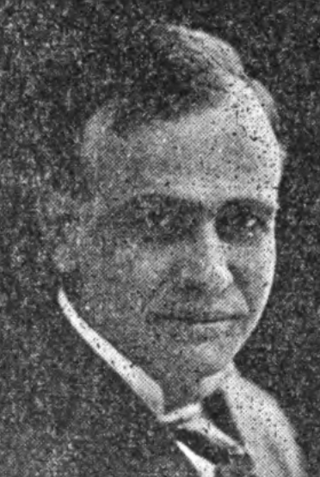Related Research Articles

The 1916 United States presidential election was the 33rd quadrennial presidential election, held on Tuesday, November 7, 1916. Incumbent Democratic President Woodrow Wilson narrowly defeated former associate justice of the Supreme Court Charles Evans Hughes, the Republican candidate.

William Freeman Vilas was an American lawyer, politician, and United States Senator. In the U.S. Senate, he represented the state of Wisconsin for one term, from 1891 to 1897. As a prominent Bourbon Democrat, he was also a member of the cabinet of U.S. President Grover Cleveland, serving as the 33rd Postmaster General and the 17th Secretary of the Interior.

Victor Luitpold Berger was an Austrian–American socialist politician and journalist who was a founding member of the Social Democratic Party of America and its successor, the Socialist Party of America. Born in the Austrian Empire and present-day Romania, Berger immigrated to the United States as a young man and became an important and influential socialist journalist in Wisconsin. He helped establish the so-called Sewer Socialist movement. Also a politician, in 1910, he was elected as the first Socialist to the U.S. House of Representatives, representing a district in Milwaukee, Wisconsin.

Thomas James Walsh was an American lawyer and Democratic Party politician from Helena, Montana who represented Montana in the US Senate from 1913 to 1933. He was initially elected by the state legislature, and from 1918 on by popular vote, in keeping with the requirements of the Seventeenth Amendment to the United States Constitution.

Daniel Webster Hoan was an American politician who served as the 32nd Mayor of Milwaukee, Wisconsin from 1916 to 1940. A lawyer who had served as Milwaukee City Attorney from 1910 to 1916, Hoan was a prominent figure in Socialist politics and Milwaukee's second Socialist mayor. His 24-year administration remains the longest continuous Socialist administration in United States history. A panel of 69 scholars in 1993 ranked him among the ten best mayors in American history.

The 64th United States Congress was a meeting of the legislative branch of the United States federal government, composed of the United States Senate and the United States House of Representatives. It met in Washington, D.C., from March 4, 1915, to March 4, 1917, during the third and fourth years of Woodrow Wilson's presidency. The apportionment of seats in the House of Representatives was based on the 1910 United States census.

John James Blaine was an American lawyer and politician. He was the 24th Governor of Wisconsin and a United States senator. He also served as Attorney General of Wisconsin and a member of the Wisconsin State Senate.

The Progressive Party was a third party in the United States formed in 1912 by former president Theodore Roosevelt after he lost the presidential nomination of the Republican Party to his former protégé rival, incumbent president William Howard Taft. The new party was known for taking advanced positions on progressive reforms and attracting leading national reformers. The party was also ideologically deeply connected with America's indigenous radical-liberal tradition.

William Joseph Granfield was a United States representative from Massachusetts.
William Duncan Connor was a Canadian-born American politician and the 20th Lieutenant Governor of Wisconsin from 1907–1909.

Thomas Frank Konop was a U.S. Representative from Wisconsin.

From January 3 to June 5, 2012, voters of the Democratic Party chose its nominee for president in the 2012 United States presidential election. President Barack Obama won the Democratic Party nomination by securing more than the required 2,383 delegates on April 3, 2012, after a series of primary elections and caucuses. He was formally nominated by the 2012 Democratic National Convention on September 5, 2012, in Charlotte, North Carolina.

Adoph F. Germer was an American socialist political functionary and union organizer. He is best remembered as National Executive Secretary of the Socialist Party of America from 1916 to 1919. It was during this period that the Left Wing Section of the Socialist Party emerged as an organized faction. Germer was instrumental as one of the leaders of the SPA's "Regular" faction in orchestrating a series of suspensions, expulsions, and "reorganizations" of various Left Wing states, branches, and locals and thereby controlling the pivotal 1919 Emergency National Convention of the SPA, and thus forcing the Left Wing to establish new organizations of their own, the Communist Labor Party of America and the Communist Party of America.

Carl D. Thompson was an American preacher, Christian Socialist, and Social Democratic politician. A Congregationalist minister early in his life, Thompson is best remembered as a lecturer and political organizer for the Socialist Party of America.

Winfield Romeo Gaylord was an American journalist, minister, and socialist lecturer. He represented the northwest side of the city of Milwaukee in the Wisconsin State Senate during the 1909 and 1911 sessions. He also ran for U.S. House of Representatives five times on the Socialist or Social Democratic ticket, and was a candidate for Governor of Wisconsin in 1906.
Carl Minkley was an interior decorator, housepainter, labor movement activist and Socialist Party of America politician from Milwaukee, Wisconsin who served two terms in the Wisconsin State Assembly.
Kenneth Kunde (1916-1928) was a politician in Wisconsin.

The 1916 United States Senate election in Wisconsin was held on November 7, 1916.
References
- ↑ "Wisconsin Reports, Volume 166". Callaghan and Company. 1918. Retrieved 19 July 2019.
- ↑ "Wolfe, William F." Political Graveyard. Retrieved 2013-06-24.
- ↑ "Wolfe, William F." Our Campaigns.com. Retrieved 2013-06-24.